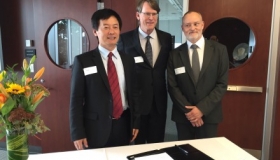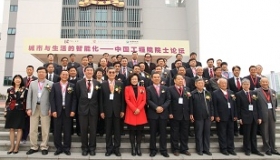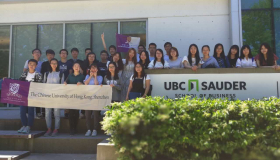Sophomore’s Paper Accepted by IEEE International Symposium on Information Theory 2018
The academic paper of Wang Jie, a sophomore majoring in Pure Mathematics, and Yang Shenghao, an assistant professor of School of Science and Engineering, was accepted by the International Symposium on Information Theory 2018 (ISIT 2018). The paper proves that the upper bounds of the computational capabilities proposed by the former studies are not always compact by studying the computational capabilities of a network. Wang Jie, the first author of this paper, graduated from Shenzhen Hongling Middle School.
Paper introduction
The paper considers the network function calculation model as shown in the right figure: The aggregation node is expected to calculate the objective function of the data generated from the source node, where the network link bandwidth is limited, and the intermediate network nodes perform network coding without any computational restrictions. By studying the computing capacities of a network, the thesis proves that the upper bounds of computing power proposed by previous researchers are not always compact. At the same time, the method used in this paper can be extended to study the computing power of general network functions. It also has guiding significance and reference value for the development of practical applications of cloud computing and fog computing.

Network described by the paper
About ISIT
The International Symposium on Information Theory (ISIT) , a top international annual conference in the field of information theory, is organized by the Institute of Electrical and Electronics Engineers (IEEE). The 2018 conference (ISIT2018) centered around recent research progress in the direction of information theory will be held in Weill, Colorado, USA.
About the author

Wang Jie
Wang Jie, a sophomore in Pure Mathematics from SSE, was the first author of this paper. From his summer in freshman year, he worked on research projects related to network computing capabilities in the network coding laboratory. Recently, he is trying to use information theory to study issues related to artificial intelligence, such as using information bottlenecks to explore issues related to deep learning. His supervisor, Yang Shenghao, Assistant Professor of SSE, is the second author of this paper.

Dr. Yang Shenghao
Dr. Shenghao Yang received his B.S. degree from Nankai University in 2001, his M.S. degree from Peking University in 2004, and his Ph.D. degree in Information Engineering from The Chinese University of Hong Kong (CUHK) in 2008. He was a Postdoctoral Fellow in the University of Waterloo from 2008 to 2009 and in the Institute of Network Coding, CUHK from 2010 to 2012. He was with the Tsinghua University before joining CUHK-Shenzhen.
Dr. Yang's research interests include network coding, information theory, coding theory, network computation and quantum information. He has published more than 40 papers on international journals and conferences, including IEEE Transactions on Information Theory. He is the co-inventor of BATS code and has two US patents granted.
Dialogue with Wang Jie
About the paper:
Q: ISIT is a top international conference. Participants are generally international academics with outstanding achievements. As a sophomore, what encouraged you to submit your paper to ISIT?
A: I think that under the guidance of Prof. Yang Shenghao, the research conclusions obtained are very important in the field of information theory. Our research is valuable enough to be published at the International Symposium on Information Theory 2018. The breakthrough is to have found out the flaws of the HYL bound theorem, which can then prompt people to refine and improve the theorem in the future.
Q: In addition to theoretical mathematics and knowledge about computer science, what other skills were included?
A: English academic writing ability. While working on the paper, I collected all the ideas for writing a paper. The process is the simplest. The hardest part is how to write. If you want to express your ideas clearly, there should be no grammatical mistakes. Then, each sentence should be concise, each word of your paper cannot be deleted. Third, cohesion of the sentences. To achieve these three points had brought great obstacles and I spent a whole week with Prof. Yang in just amending this paper. The process was very painful.
About the lab:
Q: When and how did you start your work at the lab? Are there any requirements on capacity for a student researcher?
A: When I finished my freshman studies, I received a recruitment notice email from the lab. It was before the summer course. With the recommendation letter from my TA, Ma Jun (Doctoral student), I passed the written test and the interview. Normally, candidates need to showcase their ability in writing code. I was asked to analyze some papers to make conclusions because I focus on theory mainly. Apart from capacity, I think what really matters is your attitude. For freshmen, we are basically at the same level in terms of code-writing. Enthusiasm for exploration will help you to stand out.
Q: How does your routine work and life at the lab look like?
A: My partners are all doing network work, that is, writing code. The routine includes testing raspberry pies and building networks. I work on pure math, so I am more about the theories. As for daily life, we have classes during the day and conduct research at the laboratory at night. At least half of the people in our labs burn the midnight oil for research and we have to go to the morning classes. So, this is the life of our lab people.
About learning and living:
Q: If it is so hard, would you suggest your classmates to join the lab?
A: Actually, it's fine. I usually relax on weekends and spend time with my girlfriend (LOL). If you are interested and have enough spare time to join the lab, just do it. Make sure you have around eight hours a week in the lab. In the freshman year, I read some books on theoretical mathematics. When you are doing academic study, you need to work on a practical problem and a motivation. If you just think without action, you would have no motivation. When I was in the lab, I was motivation-oriented. I wasn't simply studying theoretical knowledge such as abstract algebra. In the process, I was also attracted by information theory.
Q: How do you handle stress if you are so busy with the research and courses?
A: I will allocate energy and plan ahead. Planning in advance is particularly important. If the project is to produce results in May, I would take the initiative when the task is released.
About interests:
Q: Do you usually read books unrelated to your major and research fields? As burden on major learning gets heavier, will you develop a thinking model related to your major?
A: I personally like to study classical literature and novels. I also read Tao Te Ching, written by Lao zi. The general education provided by the University is also very inspiring and I can absorb both arts and science to balance the mode of thinking.




